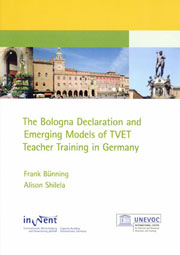
The UNESCO-UNEVOC International Centre: Who We Are | What We Do | Working With Us | Get in Touch
The UNEVOC Network: Learn About the Network | UNEVOC Network Directory
For Members: UNEVOC Centre Dashboard
Thematic Areas: Inclusion and Youth | Digital Transformation | Private Sector Engagement | SDGs and Greening TVET
Our Key Programmes & Projects: BILT: Bridging Innovation and Learning in TVET | Building TVET resilience | TVET Leadership Programme | WYSD: World Youth Skills Day
Past Activities: COVID-19 response | i-hubs project | TVET Global Forums | Virtual Conferences | YEM Knowledge Portal
Our Services & Resources: Publications | TVET Forum | TVET Country Profiles | TVETipedia Glossary | Innovative and Promising Practices | Toolkits for TVET Providers | Entrepreneurial Learning Guide
Events: Major TVET Events | UNEVOC Network News

| Author/s: | Bünning, Frank; Shilela, Alison |
| Publisher/s: | InWent - Internationale Weiterbildung und Entwicklung gGmbH Capacity Building International; UNESCO-UNEVOC |
| Published: | 2006 in Bonn, Germany |
| ISBN: | 3-939394-00-9 |
The implementation of the Bologna Declaration (1999) has resulted in major changes to degree structures in Germany. The recommendation to adopt a two-cycle system of degree awards (Bachelor and Master) within a given timeframe represents a radical conceptual shift for curriculum designers and policy makers in German universities where the traditional degree system consists of one block of study leading to a Master degree. The process of this reform and its resultant consequences remain live issues in the university sector and can be observed as the focus for conference proceedings over the last six years. The reform has posed particular challenges to universities concerned with TVET teacher training, given the professional nature of this orientation. As the dust begins to settle on the landscape, a clearer picture of the newly-established models for Bachelor and Master degrees can be observed. With four years of further development ahead, this paper outlines generic developments in the university sector in Germany and focuses on the newly emerging structures of Bachelor and Master programmes in the TVET teacher training sector. The paper considers the extent to which such developments have remained in keeping with the original intentions of the Bologna Declaration and the positive changes envisaged by the TVET teacher training sector. Some aspects of the reforms can be seen to offer new opportunities and advantages for students and employers, while others have created a multifaceted landscape for TVET teacher training, which requires a shared understanding of the new programmes by universities and employers alike, if the new degree models are to achieve their originally-intended aims.